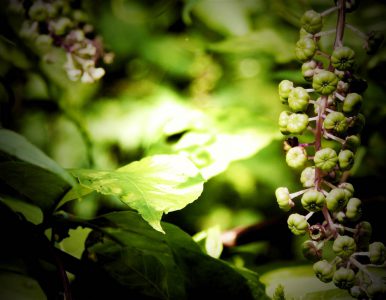
Between existence and essence
A dialogue between Simones the green berries and Aurélius the angel. The Simones assert that femininity is a condition imposed by history and society and question traditional roles. Aurelius wants to be the guardian of classical Judeo-Christian thought while remaining attentive and compassionate.
Simones: Aurelius, come here, we would like to ask you something …
Aurelius: hurry, then, I have a soul in need to counselling and I’m afraid it will succumb to evil if I delay too long.
Simones: well, that has something to do with what we want to talk to you about. Why do you feel you have to go help this troubled creature? Don’t you think that you are just following a script written for you because you are an angel and by definition, an angel helps others? And that even if you rebelled, you would still be an angel, although a rebellious angel. Your essence would always have the upper hand. For us, we ask ourselves, between existence and essence, who is really first? We feel like we are determined to develop our feminine nature because we were born female. There’s no freedom in our existence.
Aurelius: but what questions, Simones! God created you free to choose. You certainly have a nature, or an essence if you prefer the term, but you can decide your actions in order to choose between good and evil. They define who you are, not the other way around.
Simones: if you say that we are created free, don’t you see that it is a paradox? It means that we are doomed to choose, so we are not really free. Our nature prompts us to choose and there is no choice.
Aurelius: but it is your actions that reveal who you are and you have to make up your mind about that, don’t you agree? Your essence is just a potential that you need to develop and if you make the right choices, you will be happy because you are close to your nature.
Simones: that’s it, our essence encloses us in a role. So, because we are of a feminine nature, we have to act in a certain way. Our actions which are supposed to give us an identity are in fact only updating the one that already exists at the start. So we are still influenced by what came before. We all have a role that we must play and that we sometimes hate.
Aurelius: hold on here my dears, I love what I do and I can’t help but love it.
Simones: that’s exactly what we mean, you can’t be different from what you are. In your case, this may suit you …
Aurelius: yes, that suits me perfectly because to be happy is to understand your nature and to accomplish it.
Simones:… but for others who find themselves imperfect or mean or who would like to experiment with new identities, they can’t change anything. They suffer from it and it is as if this suffering strengthens them in their wickedness or their unfulfilled desire to be different.
Aurelius: come on, what are you saying, redemption is offered to all! God did not create evil creatures, they have become evil and they can change. It is their lack of faith in their ability to improve themselves that embitter them, not their essence.
Simones: Aurelius, your stubbornness in keeping ready-made answers is also your answer because the lack of faith you speak of could be part of who these creatures are. It would prove that you cannot escape your fate. Our actions define us in existence but they are nevertheless defined a priori by our essence.
Aurelius: so why did you ask me these questions if you think you know the answer?
Simones: you are supposed to know about divine purposes, we thought you could have better enlightened us.
Aurelius: to ask these kinds of questions is to want to know more than you need to, dear Simones. I advise you to accept who you are and I remind you that to believe God created creatures devoid of faith is heresy. How could they choose, that doesn’t make sense.
Simones (between them): he won’t tell us anything, it’s not worth it. (To Aurelius): alright, Aurelius, we’re not holding you back anymore, have a nice day.
Aurelius: you too, my friends, and remember that your generosity is your charm; keep it alive, that is the main thing.
Simones (between them): for an angel, he is not very bright; we should have asked Baruch.
Aurelius (to himself): I will pray for them; if they no longer listen to their hearts, they will become increasingly unsure of what to do and they’ll be unhappy.
Analysis
Simones and Aurelius talk about existence and essence to find out if actions determine personality or if personality determines actions. Behind that, it is also a question of knowing if freedom exists or if it is an illusion.
The Simones affirm that in order to act, one must first be and that one is always determined by external circumstances. It follows that actions are not free and that thoughts are dependent on the context in which we live. Acting gives the illusion of being free when you do not want to or cannot see all the determinists at work. This is what causes their frustration.
Aurelius takes the point of view of the believer who affirms that the world is the best possible. Moreover, if the essence actually precedes existence (it is first necessary to be in order to be able to act), free choices, inscribed in the nature of things, are really what allows beings to define themselves during their existence. No one should not try to guess and understand the complexity of the world because this ignorance is what allows freedom.
Possible discussions
How context determines what we are and how what we are determines context?
Does happiness consist in figuring out how to best accord with our destiny?
Finally
Want to think a little more? See, for example, Existentialism is a humanism where Sartre explains how what we do determines who we are.
Want to contribute to these dialogues? Write your comments and questions below.
Want to know more about the tastes of Aurelius and Simones? Their favorite books are in the domain library.

